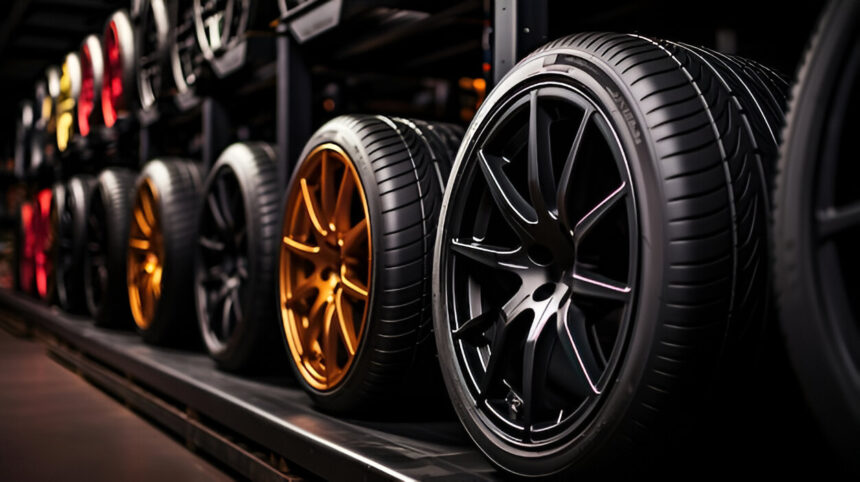Alloy wheels are a popular choice for car enthusiasts and everyday drivers alike, offering a blend of style, performance, and durability. These wheels are made from a combination of aluminum and other metals, providing numerous advantages over traditional steel wheels. In this comprehensive guide, we will delve into the world of alloy wheels, exploring their benefits, types, maintenance, and more.
Benefits of Alloy Wheels
Alloy wheels offer several advantages over steel wheels, making them a preferred choice for many vehicle owners. One of the primary benefits is their lighter weight, which can improve overall vehicle performance. The reduced weight of alloy wheels can enhance acceleration, braking, and fuel efficiency, as the vehicle has less weight to move.
Additionally, alloy wheels dissipate heat more effectively than steel wheels, which can help improve brake performance and reduce the risk of brake fade during intense driving conditions. The superior heat conduction of alloy wheels also helps prolong the life of the tires and braking system.
Another significant advantage of alloy wheels is their aesthetic appeal. These wheels are available in a wide range of designs, finishes, and sizes, allowing drivers to customize their vehicles and enhance their visual appeal. From sleek and modern designs to classic and sporty styles, alloy wheels can complement any vehicle and reflect the owner’s personal taste.
Types of Alloy Wheels
Alloy wheels come in various types, each offering unique characteristics and benefits. The most common types of alloy wheels include:
- Cast Alloy Wheels: These wheels are made by pouring molten aluminum into a mold, resulting in a solid wheel with a uniform structure. Cast alloy wheels are cost-effective to produce and are suitable for most vehicles.
- Forged Alloy Wheels: Forged wheels are created by applying high pressure to a solid piece of aluminum, resulting in a denser and stronger wheel. These wheels are lighter and more durable than cast wheels, making them ideal for high-performance vehicles.
- Spun Alloy Wheels: Spun wheels are formed by spinning a heated aluminum disc on a mold, compressing the metal into the desired shape. These wheels are known for their lightweight construction and precise manufacturing process.
- Multi-Piece Alloy Wheels: Multi-piece wheels consist of several components, including the rim, center, and outer barrel, which are bolted together. These wheels offer flexibility in design and customization options.
Maintaining Alloy Wheels
Proper maintenance is crucial to ensuring the longevity and performance of alloy wheels. Here are some tips for maintaining your alloy wheels:
- Regular Cleaning: Clean your alloy wheels regularly to remove dirt, brake dust, and other contaminants that can cause corrosion. Use a mild detergent and a soft brush to avoid scratching the surface.
- Avoid Harsh Chemicals: Avoid using abrasive cleaners or harsh chemicals, as they can damage the finish of the alloy wheels. Opt for pH-neutral wheel cleaners to protect the integrity of the wheels.
- Inspect for Damage: Periodically inspect your alloy wheels for signs of damage, such as cracks, dents, or bends. Address any issues promptly to prevent further damage and ensure safe driving.
- Protective Coating: Apply a protective coating or wax to the alloy wheels to create a barrier against environmental elements and maintain their shine. This coating can also make cleaning easier and prolong the life of the wheels.
- Proper Storage: If you have multiple sets of wheels, store the unused ones in a clean and dry environment to prevent corrosion and damage. Consider using wheel bags or covers for added protection.
Choosing the Right Alloy Wheels
When selecting alloy wheels for your vehicle, consider the following factors to make an informed decision:
- Size: Choose alloy wheels that are compatible with your vehicle’s specifications, including the diameter, width, and offset. Incorrectly sized wheels can affect performance and safety.
- Design: Select a design that complements the overall look of your vehicle and reflects your style preferences. Whether you prefer a classic, modern, or sporty design, there are numerous options to choose from.
- Finish: Consider the finish of the alloy wheels, such as polished, painted, machined, or powder-coated. The finish not only affects the appearance but also the durability and maintenance requirements of the wheels.
- Budget: Determine your budget for alloy wheels, considering factors such as brand reputation, quality, and warranty. While high-end alloy wheels may offer superior performance and aesthetics, there are budget-friendly options available.
Conclusion
Alloy wheels are a popular choice for drivers seeking enhanced performance, style, and durability. With their lightweight construction, heat dissipation properties, and aesthetic appeal, alloy wheels offer numerous benefits over traditional steel wheels. By understanding the different types of alloy wheels, proper maintenance techniques, and factors to consider when choosing wheels, drivers can make informed decisions to upgrade their vehicles. Whether you’re a car enthusiast looking to optimize performance or a casual driver wanting to enhance the visual appeal of your vehicle, alloy wheels are a versatile and practical choice that can elevate your driving experience.





